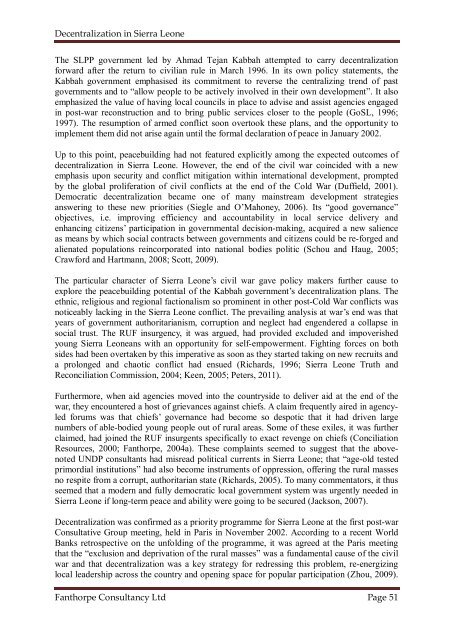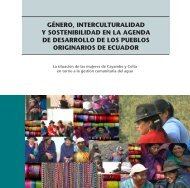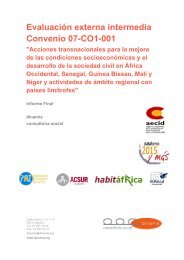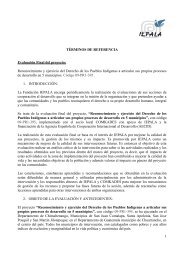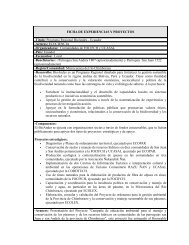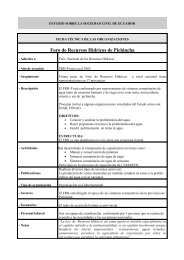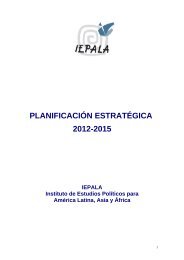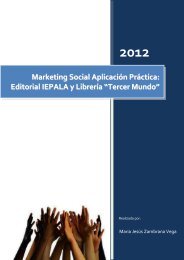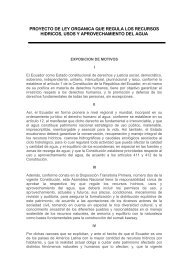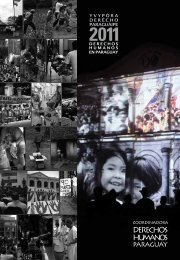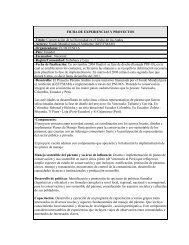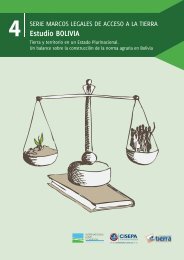Decentralization in Sierra Leone - Research for Development
Decentralization in Sierra Leone - Research for Development
Decentralization in Sierra Leone - Research for Development
Create successful ePaper yourself
Turn your PDF publications into a flip-book with our unique Google optimized e-Paper software.
<strong>Decentralization</strong> <strong>in</strong> <strong>Sierra</strong> <strong>Leone</strong>The SLPP government led by Ahmad Tejan Kabbah attempted to carry decentralization<strong>for</strong>ward after the return to civilian rule <strong>in</strong> March 1996. In its own policy statements, theKabbah government emphasised its commitment to reverse the centraliz<strong>in</strong>g trend of pastgovernments and to “allow people to be actively <strong>in</strong>volved <strong>in</strong> their own development”. It alsoemphasized the value of hav<strong>in</strong>g local councils <strong>in</strong> place to advise and assist agencies engaged<strong>in</strong> post-war reconstruction and to br<strong>in</strong>g public services closer to the people (GoSL, 1996;1997). The resumption of armed conflict soon overtook these plans, and the opportunity toimplement them did not arise aga<strong>in</strong> until the <strong>for</strong>mal declaration of peace <strong>in</strong> January 2002.Up to this po<strong>in</strong>t, peacebuild<strong>in</strong>g had not featured explicitly among the expected outcomes ofdecentralization <strong>in</strong> <strong>Sierra</strong> <strong>Leone</strong>. However, the end of the civil war co<strong>in</strong>cided with a newemphasis upon security and conflict mitigation with<strong>in</strong> <strong>in</strong>ternational development, promptedby the global proliferation of civil conflicts at the end of the Cold War (Duffield, 2001).Democratic decentralization became one of many ma<strong>in</strong>stream development strategiesanswer<strong>in</strong>g to these new priorities (Siegle and O’Mahoney, 2006). Its “good governance”objectives, i.e. improv<strong>in</strong>g efficiency and accountability <strong>in</strong> local service delivery andenhanc<strong>in</strong>g citizens’ participation <strong>in</strong> governmental decision-mak<strong>in</strong>g, acquired a new salienceas means by which social contracts between governments and citizens could be re-<strong>for</strong>ged andalienated populations re<strong>in</strong>corporated <strong>in</strong>to national bodies politic (Schou and Haug, 2005;Craw<strong>for</strong>d and Hartmann, 2008; Scott, 2009).The particular character of <strong>Sierra</strong> <strong>Leone</strong>’s civil war gave policy makers further cause toexplore the peacebuild<strong>in</strong>g potential of the Kabbah government’s decentralization plans. Theethnic, religious and regional factionalism so prom<strong>in</strong>ent <strong>in</strong> other post-Cold War conflicts wasnoticeably lack<strong>in</strong>g <strong>in</strong> the <strong>Sierra</strong> <strong>Leone</strong> conflict. The prevail<strong>in</strong>g analysis at war’s end was thatyears of government authoritarianism, corruption and neglect had engendered a collapse <strong>in</strong>social trust. The RUF <strong>in</strong>surgency, it was argued, had provided excluded and impoverishedyoung <strong>Sierra</strong> <strong>Leone</strong>ans with an opportunity <strong>for</strong> self-empowerment. Fight<strong>in</strong>g <strong>for</strong>ces on bothsides had been overtaken by this imperative as soon as they started tak<strong>in</strong>g on new recruits anda prolonged and chaotic conflict had ensued (Richards, 1996; <strong>Sierra</strong> <strong>Leone</strong> Truth andReconciliation Commission, 2004; Keen, 2005; Peters, 2011).Furthermore, when aid agencies moved <strong>in</strong>to the countryside to deliver aid at the end of thewar, they encountered a host of grievances aga<strong>in</strong>st chiefs. A claim frequently aired <strong>in</strong> agencyled<strong>for</strong>ums was that chiefs’ governance had become so despotic that it had driven largenumbers of able-bodied young people out of rural areas. Some of these exiles, it was furtherclaimed, had jo<strong>in</strong>ed the RUF <strong>in</strong>surgents specifically to exact revenge on chiefs (ConciliationResources, 2000; Fanthorpe, 2004a). These compla<strong>in</strong>ts seemed to suggest that the abovenotedUNDP consultants had misread political currents <strong>in</strong> <strong>Sierra</strong> <strong>Leone</strong>; that “age-old testedprimordial <strong>in</strong>stitutions” had also become <strong>in</strong>struments of oppression, offer<strong>in</strong>g the rural massesno respite from a corrupt, authoritarian state (Richards, 2005). To many commentators, it thusseemed that a modern and fully democratic local government system was urgently needed <strong>in</strong><strong>Sierra</strong> <strong>Leone</strong> if long-term peace and ability were go<strong>in</strong>g to be secured (Jackson, 2007).<strong>Decentralization</strong> was confirmed as a priority programme <strong>for</strong> <strong>Sierra</strong> <strong>Leone</strong> at the first post-warConsultative Group meet<strong>in</strong>g, held <strong>in</strong> Paris <strong>in</strong> November 2002. Accord<strong>in</strong>g to a recent WorldBanks retrospective on the unfold<strong>in</strong>g of the programme, it was agreed at the Paris meet<strong>in</strong>gthat the “exclusion and deprivation of the rural masses” was a fundamental cause of the civilwar and that decentralization was a key strategy <strong>for</strong> redress<strong>in</strong>g this problem, re-energiz<strong>in</strong>glocal leadership across the country and open<strong>in</strong>g space <strong>for</strong> popular participation (Zhou, 2009).Fanthorpe Consultancy Ltd Page 51


